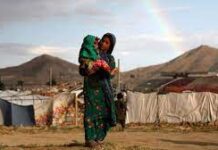Jacinda Ardern’s left-inclining government will confront an approaching financial headache from COVID-19.
WELLINGTON: Prime Minister Jacinda Ardern diverted talking from the heart and grinning through affliction into a triumphant recipe for victory re-appointment as New Zealand’s chief on Saturday.
Presently Ardern, who became well known by smashing COVID-19 in the nation and recuperating the country after a slaughter of Muslims by a racial oppressor, faces a test to give her initiative reaches out past emergency the executives and generosity.
Her Labor Party won an avalanche triumph in the overall political decision, a resonating order that introduces New Zealand’s first simply left-inclining government in quite a while and may permit her to frame a solitary gathering government.
The success is likewise the award for Ardern’s initiative through a progression of uncommon occasions that molded her initial three-year term: the shooter’s slaughter of 51 admirers at two Christchurch mosques and the ejection of the White Island spring of gushing lava, which executed 21.
Be solid, be thoughtful,” said New Zealand’s most youthful executive in over a century rehashed through these emotional occasions, her sympathetic authority and emergency the board abilities regularly concealing her administration’s deficiencies.
Ardern’s left-inclining government will confront an approaching financial aftereffect from COVID-19, a profound dive in yield and flood owing debtors after her severe lockdowns, a declining lodging emergency and a developing separation among rich and poor.
Regardless of promising a groundbreaking term in 2017, Ardern’s moderate lodging program was hindered by botches, plans for a capital increases charge that would have tended to the developing rich-helpless separation were rejected, and her administration missed the mark concerning its objective to decrease youngster destitution.
Indeed, even on environmental change, which Ardern called “my age’s atomic free second”, progress has been gradual.
“I believe most would agree they have not accomplished what they had wanted to accomplish,” said Ganesh Nana, Research Director at Wellington monetary research organization BERL. “There are many baffled with the movement of progress.”
Ardern burst onto the worldwide scene in 2017 when she turned into the world’s most youthful female head of government at 37 years old.
She turned into a worldwide symbol in an ascent named “Jacinda-insanity,” as she battled energetically for ladies’ privileges and a conclusion to kid destitution and monetary disparity in the island country.
Ardern raised a Mormon by her mom and cop father, left the congregation over its position on LGBTQ individuals in the mid 2000s and has since portrayed herself as skeptic.
Asked by a TV moderator, hours in the wake of being delegated Labor pioneer in 2017, regardless of whether she wanted to have kids, Ardern said it was “absolutely unsuitable in 2017 to state that ladies ought to need to address that question in the working environment”.
Ardern did in reality have a child girl in June 2018, eight months subsequent to turning out to be head administrator – just the second chosen pioneer for conceive an offspring while in office, after Pakistan’s Benazir Bhutto.
Many took her pregnancy and maternity leave in office as representing progress for ladies pioneers. Inside a quarter of a year of showing up on the planet, her little girl Neve Te Aroha was at the U.N. General Assembly in New York with her mom.
Ardern is feted universally as a component of another influx of reformist and youthful pioneers that incorporate France’s Emmanuel Macron and Canada’s Justin Trudeau.
Helen Clark, a previous New Zealand executive for whom Ardern worked after college, said the youthful pioneer speaks to an invigorating and sharp purpose of contrast in this present reality where news is overwhelmed by expressions of libertarian and dictator pioneers.
“Jacinda Ardern can be best contrasted and the three Scandinavian ladies head administrators who are from the middle left,” said Clark, co-seat of a World Health Organization board on the worldwide COVID-19 reaction.
“Every one of them have driven great reactions to the pandemic, putting wellbeing security first and conveying in a sympathetic manner with the general population in every one of their nations.”
A year ago Ardern got overall applause for her reaction to the Christchurch assaults, which she named psychological oppression. She wore a hijab as she met the Muslim people group the following day, revealing to them the nation was “joined in anguish”.
She conveyed a prohibition on self loading guns and other weapon checks, an unmistakable difference to the United States, where legislators and activists have battled to address firearm brutality notwithstanding various mass shootings.
At the U.N. General Assembly, Ardern, asked world pioneers: “Consider the possibility that we presently don’t see ourselves dependent on what we resemble, what religion we practice, or where we live …. in any case, by what we esteem?
“Mankind, benevolence, an intrinsic feeling of our association with one another. Furthermore, a conviction that we are gatekeepers, of our home and our planet, however of one another.”
























